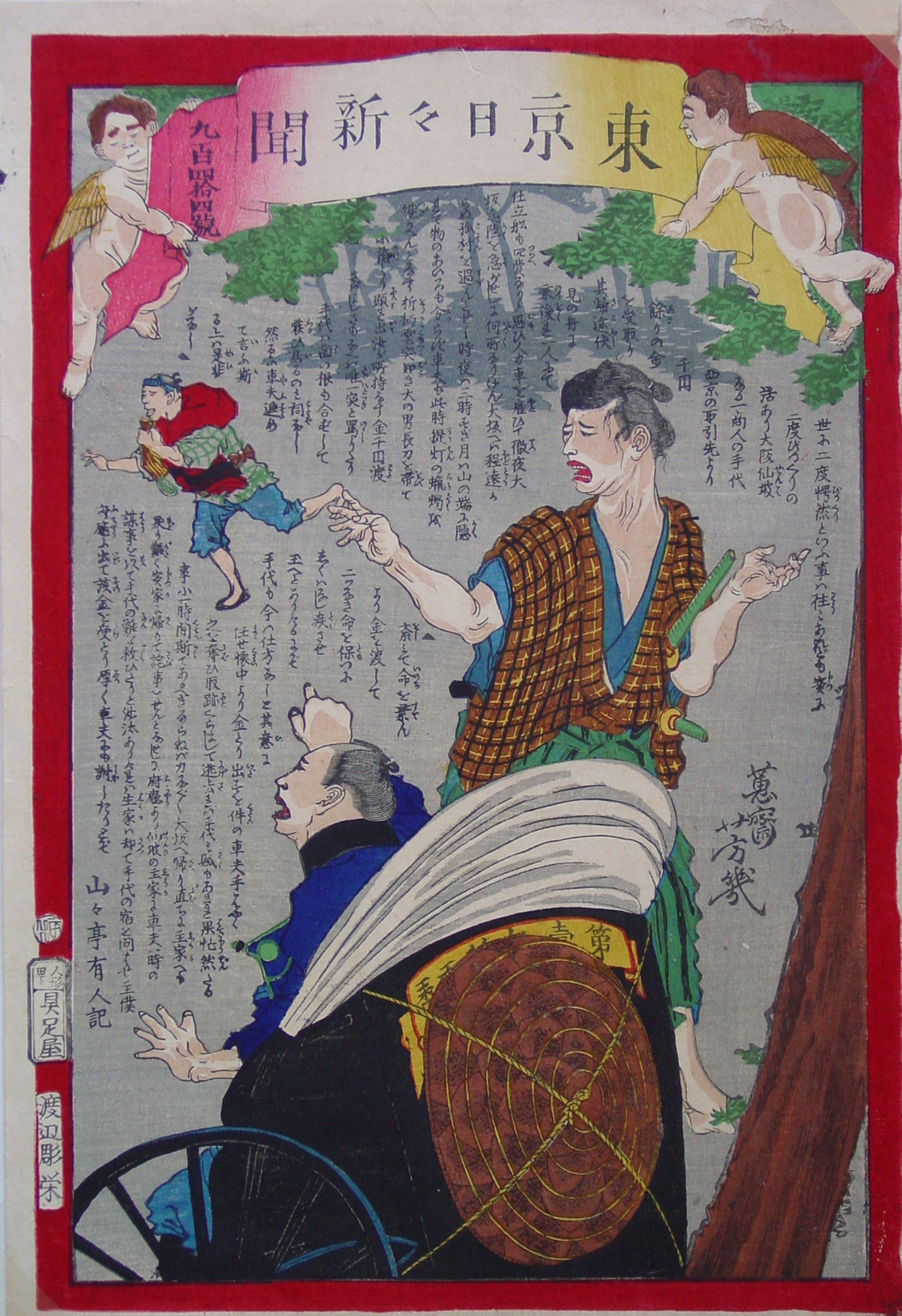About This Print
For a summary of the brief life of nishiki-e shinbun (newspaper color woodblock prints) see the article Nishiki-e shinbun and Newspapers in Meiji Japan.
1 website of William Wetherall www.nishikie.com
The Writer Jono Denpei 條野伝平 (1832-1902)
Sources: Woodblock Kuchi-e Prints: Reflections of Meiji Culture, Helen Merritt and Nanako Yamada, University of Hawaii Press, 2000, p. 198; website of William Wetherall http://www.nishikie.com/almanac/Almanac_whos_who.htmlThe writer for this print is identified as Jono Saigiku 条野 採菊 (born Jono Denpei 條野伝平) who also wrote under the name Sansantei Arindo 山々亭有人.
Born in Edo in 1832, by his late teens he had decided to become a writer of gesaku (collective term for prose fiction during the middle to late-Edo period) stories. He published his first story in 1860, and during the 1860s first Yoshiiku, then Yoshitoshi, were doing illustrations for some of his books.
He went on to found the Tokyo nichinichi shinbun, the Keisatsu shinbun and the Yamato shinbun and continued to write fiction until his death in 1902.
Story Translation by William Wetherall
Source: Nishiki-e Shinbun website of William Wetherall http://www.nishikie.com/stories/TNS-0944_double-take_holdup.htmlAs for there being two surprises in [this] world [life], though sometimes there are, in fact there are stories with two surprises. An agent of a merchant of Senba in Osaka received gold [money] in excess of 1,000 yen from a transaction in Saikyo [Kyoto], and en route back he was [too] late [to] board the [scheduled] boat at Fushimi, and alone, thinking [that hiring] a special boat would be a wasteful expense, retained a rikisha and hurried [over] the land all night to Osaka. At the time they were about to pass through an isolated village, which should not be far to Osaka -- where has it gone? -- it was after three in the night, the moon was hiding in the lims of a mountain, and they didn't know things [couldn't tell one thing from another], and just when the rikisha man was about to put in another candle in the lantern, a man of great size who seems to pierce the clouds appeared from a small shadow carrying a long sword and railed -- Hand over the 1,000 yen of gold you possess and fine; don't and [with] just [but] one thrust . . . . -- The agent just shook, the roots of his teeth not meeting, and he had no words. However, the rikisha man advanced and said -- This being the situation, there are no rights or wrongs [to discuss] [there is nothing to argue, nothing to be done but comply]. Rather than grudging [the gold] and discarding your life, there is nothing like [better than] handing over the gold and preserving your life, of which there are not [but] two. For [in the past] there was [the saying], Do what will benefit you. -- The agent too, now, resigning to this notion that there was nothing [else] to be done, took the gold from his pocket, and when the said rikisha man quickly snatched it and ran off, darkening his tracks [disappearing], both the rikisha man and the robber were appalled and stupefied. In less than an hour the agent returned to Osaka, crying -- As [things] should not have been like this, [I] had no power. -- It was hard to directly go back to his master's house, so he returned to his own house. He was about to [go to the master's house to] apologize, but from the prefectural hall there had been a notice to the master in Senba that the rikisha man with a brief deception had relieved the distress of the agent [rescued the agent from his difficulty], so the master's house instead made queries of [visited] the lodging of the agent and master and servant appeared at the prefectural hall, received the gold, and thickly [deeply] thanked the rikisha man.
Japanese Transcription of Text
Source: University of Tokyo website http://t4.iii.u-tokyo.ac.jp/archives/digital_archives/ono_collection/contents/item.6.N070.html [note: website no longer active}
世に二度愕然(びつくり)といふ事ハ往々(わうわう)あれども実(じつ)に二度びつくりの
話あり大阪仙坡(せんば)
なる一商人の手代
西京の取引先より
千円
余(あま)りの金
を受取り
其帰途(きと)伏(ふし)
見の舟に
乗後(のりをく)れ一人にて
仕立船も冗費(ついへ)なりと思(おも)ひ人力車を雇(やと)ひて徹(てつ)夜大
坂迄陸(りく)を急(いそ)がせしに何所(いづく)なりけん大坂へハ程遠(ほどとう)か
らぬ孤村(こそん)を過(すぎ)んとせし時夜ハ三時すぎ月ハ山の端に隠(かく)
れて物のあいろも分(わか)らず車夫も此時提灯(てうちん)の蝋燭(ろうそく)を
継(つぎ)かへんとなす折柄(をりから)雲(くも)突(つく)如(ごと)き大の男長刀を帯(おび)て
小蔭(かげ)より顕(あらは)れ出(いで)汝が所持なす金千円渡(わた)
さバよしさもなくバ唯(ただ)一突(ひとつき)と罵(ののし)りたり
手代ハ歯(は)の根も合ずして
震(ふる)ひ居(い)るのミ詞(ことば)なし
然るに車夫(しやふ)進(すす)め
て言(い)ふ斯(かか)
る上ハ是非(ぜひ)
がなし
吝(をし)ミて命を棄(すて)ん
より金を渡して
二ツなき命を保(たも)つに
しくハなし疾(とく)させ
玉へとありけるにぞ
手代も今ハ仕方なしと其意(い)に
任(まか)せ懐(くわい)中より金とり出(いだ)すを件(くだん)の車夫手はやく
之を奪(うば)ひ取跡(あと)くらまして逃去(にげさ)れバ手代も賊(ぞく)もあきれ果(はて)忙然(ぼうぜん)たる
事小一時間(くわん) 斯(かく)てあるべきならねバ力なくなく大坂へ帰(かへ)り直(ただ)ちに主家(しうか)へも
戻(もど)り難(がた)く実家(じつか)に帰(かへ)りて詫(わび)事をせんとなせしに府庁(ふちやう)より仙坡(せんば)の主家(しうか)に車夫一時の謀(ぼう)事を以(もつ)て手代の難(なん)を救(すく)ひたりと沙汰ありけれバ主家(しうか)は却(かへつ)て手代の宿を問はせ主僕
府庁(ふちやう)に出(いで)て該(その)金を受(うけ)とり厚(あつ)く車夫にも謝(しや)したりとぞ
山々亭有人記
Print Details
| IHL Catalog | #402 |
| Title or Description | Double-Take Holdup (九百四拾四號 No. 944) |
| Newspaper | Tokyo Nichi Nichi Shinbun 東京日々新聞 |
| Artist | Utagawa Yoshiiku (1833-1904) |
| Signature |  |
| Seal | not sealed |
| Writer of Text | Sansantei Arindo 山々亭有人 [Jono Saigiku 条野 採菊] |
| Publication Date |  |
| Publisher |  seal reading: top: 人形町 Ningyōchō bottom: 具足屋 Gusokuya |
| Carver |  |
| Impression | excellent |
| Colors | excellent |
| Condition | good- repaired wormholes upper right margin; not backed; full size |
| Genre | ukiyo-e; nishiki-e shinbun |
| Miscellaneous | |
| Format | vertical oban |
| H x W Paper | 14 1/8 x 9 5/8 in. (35.9 x 24.4 cm) |
| Literature | |
| Collections This Print | Waseda University Library 10 8059 56; The University of Tokyo Digital Archives Ono Hideo Collection N070 |


